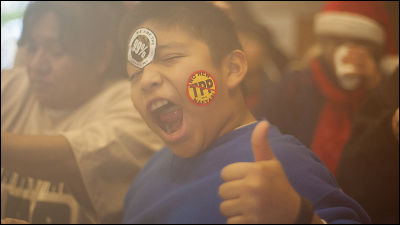TPP is opposed throughout the world, fair trade is necessary, not free trade
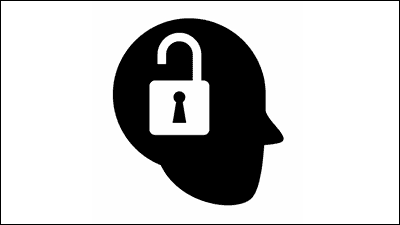
ByCourosa
Even in the United States there is a movement of "opposite TPP". I think that the problem of TPP is a composition of "Japan vs. America", but in fact it is totally different, the essence of the problem is not "country vs. country".
◆ There is a movement of "opposite to TPP" even in the United States
There is a protest demonstration that expressed a will to oppose TPP in the United States as well. The location is in Chicago, and contrary demo is occurring this September.
Deal with Asian-Pacific countries draws Labor Day protest here - Chicago Tribune

This was done by about 200 people gathered in the Grant Park in Chicago, and it is written in the article as follows.
People who participated in the protest say they wanted to call attention to the potential impact of TPP agreement on work and the environment.
"We are here to seek employment," Lorraine Ashby (66) (a retired official worker from the southeastern side of Chicago) answers.
"It is getting harder for people who do small business to create real employment to stay here.TPP is like stabbing people who create employment with a knife from behind."
In the following articles as well, the protest against TPP is reported similarly.
Pro-labor activists in Chicago protest Trans-Pacific Partnership pact - Chicago Tribune
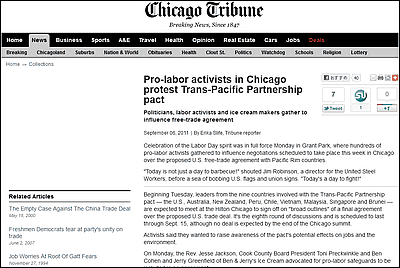
"Too many past trade agreements have sacrificed ordinary people, Wall Street and the big companies served," he said.
"We saw hundreds of thousands of high-salary jobs sent from overseas to overseas, and what we need is that in Chicago and around the world the living standard of workers It is a trade agreement that actually improves. "
"Workers can not afford even if the TPP agreement is implemented.TPP only opens a market to compete at the very bottom.TPP only runs into undiscovered capitalism.If TPP is implemented, Workers in all these countries and Japan will pay for it. "
The state of the protest is below.
Labor Day Trans-Pacific Partnership Rally - a set on Flickr
Untitled | Flickr - Photo Sharing!
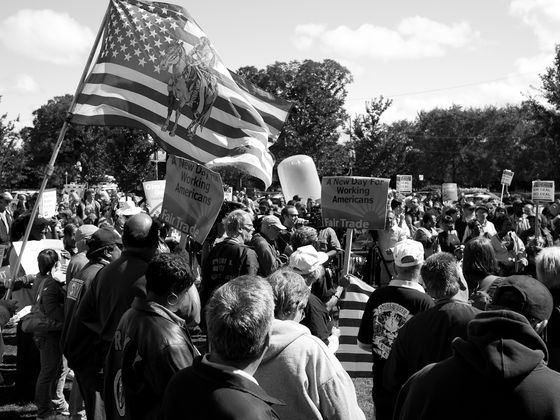
Untitled | Flickr - Photo Sharing!
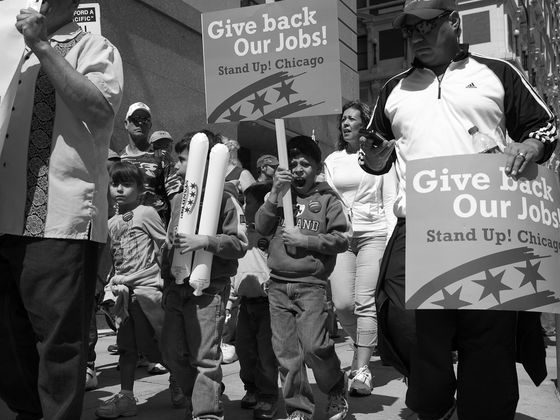
Untitled | Flickr - Photo Sharing!
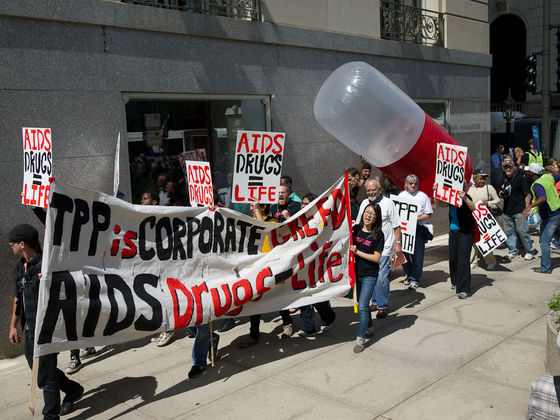
Untitled | Flickr - Photo Sharing!
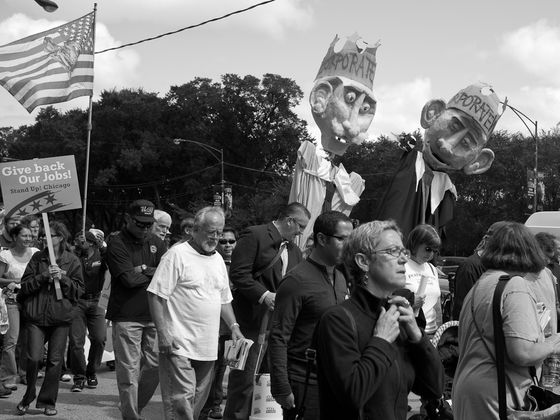
Toni Preckwinkle | Flickr - Photo Sharing!
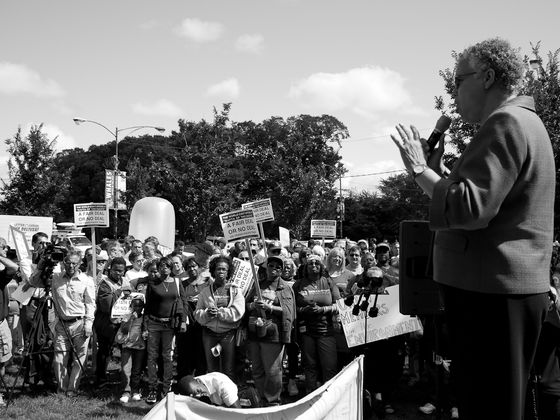
Also, not only in the United States but also in New Zealand there are groups opposing the TPP as follows, the official website has been reporting its activities at a glance and materials on TPP are also available.
TPP Watch(I am working mainly in New Zealand but I have summarized by watching activities against the TPP against the whole world)
http://tppwatch.org/
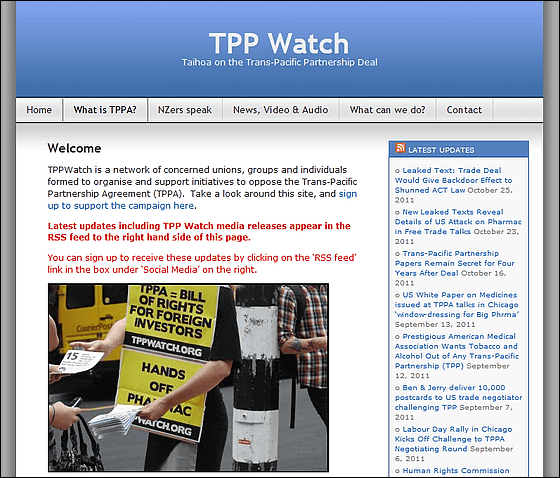
Trans Pacific Partnership Digest(It is managed with the permission from the University of Oakland Law Faculty of New Zealand and aims to supply an easily accessible and comprehensive database on TPP, linking to sites that oppose TPP around the world and various Materials are prepared)
http://tppdigest.org/
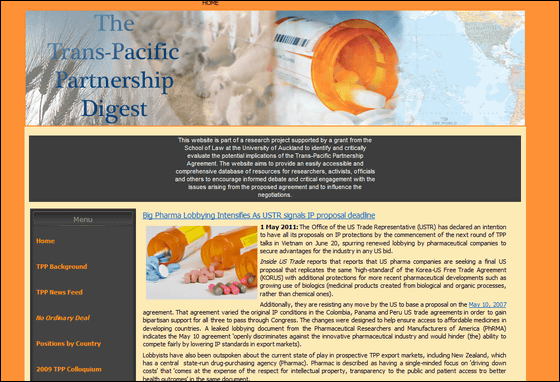
◆ True issue of TPP
For this TPP, the following book "No Ordinary Deal - Unmasking the Trans-Pacific Partnership Free Trade Agreement- ("It is not an ordinary contract ~ Exposing the TPP free trade agreement ~") "However, several stakeholders such as Professor Jane Kelsey of Auckland University issued warnings as follows, and it is touched on Japan.
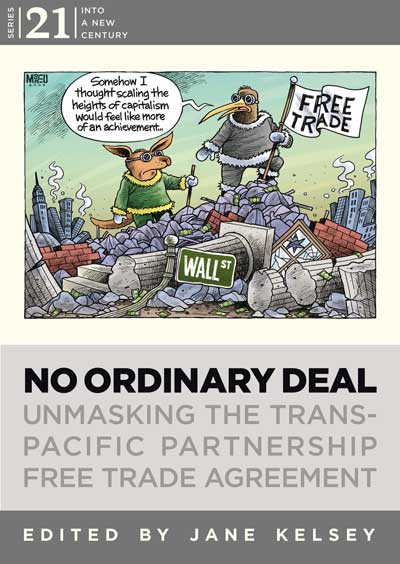
The following is the true problem of TPP mentioned in the book.
· TPP is not a normal free trade
· President Obama is only selling TPP as a key to work in the United States and economic recovery
· In relation to the TPP, nine countries other than Vietnam have already deregulated and are also promoting privatization, and many free trade has already been established among countries
· No one believes that the American dairy market will be open to New Zealand, China, India, Japan
· In TPP, the name "trade" itself is incorrect, wrong
· TPP is not related to exported goods or imported goods
· The obligation brought by the contract of TPP aims to break into core areas such as government policy and responsibility of the Diet
· American lobbyists will be able to limit the rules of medicines, foods and intellectual property as they like
· Foreign investors will be able to appeal the government to issue bills to try to reduce their investment to protect their country
In addition, in order to ascertain whether the economic effect of TPP by the Cabinet Office of Kansai University by the Cabinet Office is true or not, calculate it by actual calculation, calculate it more concrete and realistic that the government has not announced Results simulated up to the numerical value of the part are published on the site.
Economic effect of TPP (simulation by GTAP model)
http://www.takamasu.net/tpp.html
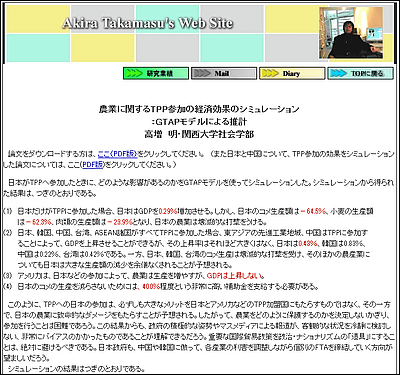
I simulated the impact of Japan when participating in TPP using the GTAP model. The results obtained from the simulation are as follows.
(1) If only Japan participates in TPP, Japan will increase GDP0.29%increase. However, the rice production in Japan is-64.5%, Wheat production is-62.3%, The production value of meat is-23.9%, And Japanese agriculture suffers catastrophically.
(2) If Japan, Korea, China, Taiwan and ASEAN countries all participate in TPP, East Asian advanced industrial area, China can raise GDP by participating in TPP, but its rate of increase is Japan is not big0.43%, Korea 0.83%, China 0.22%, Taiwan 0.42%. Meanwhile, rice production in Japan, South Korea and Taiwan will suffer a devastating blow, and for other agricultural industry it is expected that Japan will be forced to decrease the large production value.
(3) In the United States, agriculture will increase production, due to participation by Japan and others,GDP does not rise.
(4) In order not to reduce the production of Japanese rice,400%It is necessary to provide a very high subsidy of degree.
About this calculation result Professor Takashi Akira commented as follows.
Takashi Akira: TPP Cabinet Office trial calculation ─ ─ Kan 's cabinet hides "Inconvenient Truth" (News Spiral)
Such a result should have gotten by the government, and it is only thinking that not announcing it hides inconvenient results. It also does not clarify how GDP of other countries will change. In my estimate, the GDP of the United States hardly increases. This means that the increase in agricultural production is offset by the decrease in industrial production. Therefore, as the government and the mass media say, I think that Japan and the United States are not always profitable.
By TPP, Japan and the United States can not earn profits as it is. That is why there is a TPP opposition campaign in the United States, protests have occurred in countries related to TPP, and it is becoming a big fuss in Japan.
Given these facts, you can see that the "TPP participation / pros and cons" that Kyoto University Associate Professor Tsuyoshi Nakano told at NHK's "Viewpoints / Issues" gained considerable benefit.
Nakano Tsuyoshi Viewpoint / Discussion "TPP Participation Compliance" - YouTube
Full text transcripts can be found below.
Viewpoint / Discussion "TPP Participation Complaints" | Viewpoints / Discussion Boards Comment Room Blog: NHK
TPP is an international agreement that aims to eliminate barriers to entry of foreign enterprises in a wide range of fields such as finance, labor, environment and sanitation, as well as complete elimination of tariffs on agriculture and industry. Currently, nine countries are participating in negotiations and Japan is considering participation in this negotiation.
However, participating in this TPP negotiation is much more dangerous than it seems to be common.
So we are presenting the following problems.
Problem 1: Participation in TPP hinders reconstruction from the Great East Japan Earthquake
Problem 2: TPP has no merit for Japan
Problem 3: If Japan does not participate in TPP, concerns such as being left out of the tide of the world or becoming isolating countries are asked, but that is also a mistake
Problem 4: The problem of TPP covers not only agriculture but also 24 fields including finance, investment, labor regulation, hygiene, environment, intellectual property rights, government procurement
Problem 5: Once you participate in TPP negotiations, you will not be able to leave no matter how disadvantaged your rules are
Especially at the final "Participating in TPP negotiations, no matter how rules become disadvantageous it will not be possible to leave" is the biggest problem, no matter how inequal and disadvantageous contents it is It only has to follow. That is the same as I wrote before "The identity of the blacksmiths promoting "TPP" in the United States and manipulating the US government"We list all multinational gigantic companies promoting TPP by name, so you can understand by looking at them one by one.
The fact that negotiations can not be canceled on the way is also reported as follows.
2011/10/29 09:19: US negotiator withdraws from TPP halfway in Japan, enlarging consultation closing - 47 NEWS (Yoana News)
US head of the Weisel chief negotiator told reporters that there is an opinion that it is also possible to withdraw from the talks after joining the TPP negotiations in Japan "countries not intending to seriously participate in negotiations "I do not want you to do it." It is a form showing the irritation of the United States who thinks Japan's attitude may further delay negotiations.
Chile's chief negotiator, on the other hand, says, "If you can not be satisfied (from negotiations), you should leave", but this is just a discretionary regime to the USA that is hiding the TPP and has no meaning.
Furthermore, the book written by Mr. Tsuyoshi Nakano who pointed out five problems on the TPP published on March 17, 2011 "TPP overturning theoryAmazon's book review on "There are many quite sharp opinions.
Amazon.co.jp: TPP The Theory of Exile (Shueisha Shinsho): Takeshi Nakano: Books
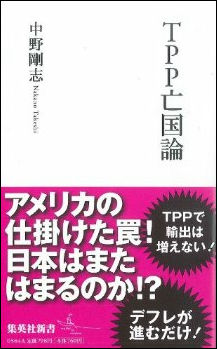
1. TPP is nothing but a trade volume with Japan other than the United States, and since Japan has already concluded an FTA with those countries, TPP is nothing but a Japan-US FTA.
2. To negotiate the Japan-U.S. FTA, it is a matter of purposely choosing an unfavorable battlefield on the TPP site where only exporters of agricultural commodities participate, except for the United States, and the duck is a green onion It is a very bad strategy with going out.
3. Even if you conclude a TPP that is a real Japan - US FTA, since the tariff rate of mining and industrial goods in the US is already only a few percent, the benefits of the Japanese side rarely occur.
4. The TPP is in the economic crisis The United States is merely pushing it to Japan as a strategy for domestic economic dependence and employment expansion, unless Japan gives great trade liberalization in agricultural products and gives great benefit to the United States The United States does not approve the conclusion. Agriculture is hit hard and Japan's food security is threatened, and the country is devastated, while Japan does not get much.
5. According to the TPP, the conclusion of the TPP will further hurt the Japanese economy suffering from deflation, as an increase in imports and liberalization of imports of labor force will promote domestic deflation.
6. Increase in exports is useless for defeating. To escape deflation and revitalize the economy, it is only necessary to induce moderate inflation by increasing government bonds and increasing public works projects.
7. The government seems to believe that it is necessary to conclude a TPP in order for US military to protect Japan in accordance with US request, but if it is not protected, self-defense will be the only way to do so, It is totally overwhelmed to present as a human companion.
What is written is an easy thing that a decent person would almost think so, but for some reason someone who says it in Japan is getting rare. The author knows that the situation is a major crisis in Japan that no intellectuals who think things strategically are gone, but I think it is true. I was greatly comforted by such a decent economist still in Japan.
The author is originally an official of the Ministry of Economy, Trade and Industry, and the author says that it is deepening of the Ministry of Economy, Trade and Industry's depth to allow it to take the argument to justly deny the policies of the affiliated department, is it true?
In addition, Mr. Tsuyoshi Nakano of the author writes the following book on November 4, 2009 before such a TPP is talked about, and rather this one highlights the essence of the problem.
Amazon.co.jp: Trap of Free Trade Awakening Protectionism: Nakano Takeshi: Books
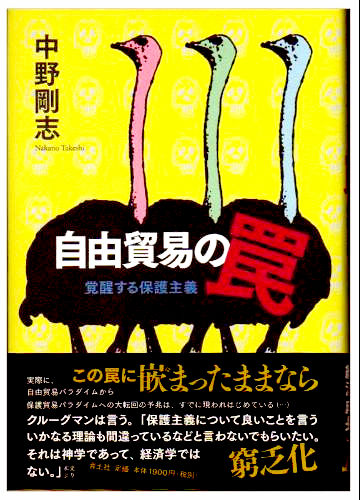
At the time of book publication, it is what assistant counselor in charge of new demand development and employment creation in economic and industrial policy department of the Ministry of Economy, Trade and Industry, and it wrote in this way.
"A competent government has a pipe of close communication with various private enterprises, has a mechanism of policy execution and the resultant feed back mechanism" (page 211)
At this point it is strange to say that the figure of a large enterprise manipulating the US government prompting TPP at this point, it is safe to assume that the essential difference between America and Japan is exactly here. According to the title of the book, TPP is "Free trade trap"is.
◆ FAIR TRADE NOT FREE TRADE "Fair trade rather than free trade"

ByHis Noodly Appendage
The biggest problem in free trade is the expansion of the gap between rich and poor. Poor things become poorer, they can not escape from poverty, rich people become increasingly rich.
This is clear from the past African example forced "free trade" based on unilateral rules, and in other countries there is no country flourishing by "free trade" in the same way."Freedom" and "fairness" are completely differentIt is.
The thing to ask is that it is a "fair" transaction, it is not unilateral "freedom" enforced by selfish rules and selfish rules, regulations, and laws. In addition, although it is easy to hear that "open trade" is comfortable to hear, in reality it is nothing but "colonial" unless it is "trade in a fair position". Because Japan is a "multinational corporation" rather than the United States that it makes a partner with TPP,A multinational corporation independent of a country is not interested in the interests of the citizens of any countryThat's why. That is why opposition campaigns occurred around the world, and problems are pointed out like mountains.
In other words,We must seek fair trade rather than free trade,about it.
◆ What should I do with Japan?

ByZeRo`SKiLL
For TPP, it does not matter whether you agree or disagree, but in fact it is only one point, "Is there really room left for negotiation from now?It is only the point that it is. Whether participating in the negotiation or not is a problem if you are invited to "I will make TPP from now, will you join?" However, even though negotiations have already been started and the schedule to finish the contents itself of the negotiation is already in the original schedule, it will be a matter of "whether to participate in negotiation or not" on the way to the end. That's out of the question.
First of all, Japan question the countries negotiating under the TPP Agreement, "Are you still leaving the room to negotiate now?" And if you know the result, the discussion will proceed. If there is room left for negotiations, we should ask them to clarify what they can negotiate. If there is not much room to negotiate, there is no meaning to participate though it is natural. "I do not know until the negotiation table" is obviously a sophistry. Considering from the standpoint of each country negotiating with the TPP in the opposite direction, if there is room for negotiation, it should clearly express that way and from any country "there is still room for negotiation" It is natural to think that there is no room to negotiate that there is no saying. If there is room to negotiate but you have not said that there is still room for negotiation, you should actively participate and go to negotiate, because the other party is thinking "It will be troubled if negotiated" It is because it is understood.
Organizing and thinking, it becomes as follows.
First of all, I will ask the delegates of the countries during the TPP negotiations as follows.
Q. "Is there really room left for negotiation from now?"
As a result of the inquiry, the assumption of the returned answer is as follows.
A: "There is no room to negotiate"
B: "There is room to negotiate"
C: No comment, no answer
How to think about each answer is like this.
A: "There is no room to negotiate"
↓
TPP negotiation There is no need to participate
B: "There is room to negotiate"
↓
Ask questions in which areas to further negotiate more finely and judge according to the result
C: No comment, no answer
↓
"If you do not reply by the due date, you decide there is no room to negotiate, can you do that?" Asked again.
As a point, do not exclude "the possibility that the other person is telling a lie." For that reason, it is important for people in responsible positions to ask questions in responsible positions and by doing so, it becomes possible to place the other's "trust" on the negotiation table. The point of each of the questions from A to C above is that if the other's answer is a lie, it is later understood that it is a lie. If it is a lie that "There is no room to negotiate", the country that made the answer loses trust. If it is a lie that "There is room to negotiate", it should not be possible to reply to the next question "Which field is there to negotiate?" It is the same as saying "No comment, no answer" answers "There is no room to negotiate."
in this way,The contents to ask questions themselves already answered the essence of the problem Answer, And then we will bring it so that we can talk further without any problem no matter what the other party answers, this is "Negotiation"is. "Negotiation" is whether it is possible to logically construct whether the above-mentioned specific question can be cast against the opponent or not and whether the other party's words can be drawn out therefrom as advantageous to them It is "bargaining power" to pass concrete actions as described above."Negotiation" and "Discussion" are differentIt is.
The discussion on TPP is mostly concentrated in extreme options of "dwarfing" the scope of the problem to agriculture etc. and "whether for or against TPP". "Dwarfing" has succeeded in shifting from the essence of the problem by reducing concrete ideas, "Do you agree or disagree with TPP" is not a conclusion in the abstract discussion, We have succeeded in bringing together "friends" without uniting with each other to cooperate. This is also a pattern of "negotiations", and now Japan has been successfully handled by this "negotiation" from top to bottom, and it has already been manipulated.
As there is a problem in front of us, we can not avoid going through. To do that, action in the real world is indispensable. And now what the government is asking for is "negotiation", it is not whether or not to participate in the TPP negotiating table at all, and it is already right now that this moment is already "negotiating" already It starts with awareness.
· First article
What on earth is "TPP"? If you read materials from the National Strategy Office you will find the problem - GIGAZINE

· Second article
The identity of the black curtains promoting 'TPP' in the US to control the US government - GIGAZINE
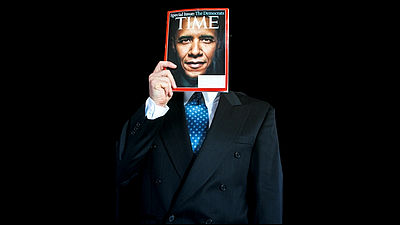
Related Posts:
in Column, Posted by KeitoYamazaki

